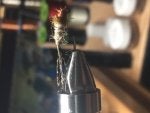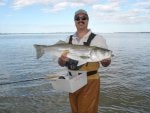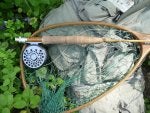Conditioned fish.
This is indeed a subject matter that l have taken a great interest with and given much of the data that l have read related to this subject have my views regarding this factor, based also on my liftime of fishing for trout and very many other species.
There are very many variable's that in some way are all tied up with what some pepole term as conditioned fish.
In fact l did write a very long article some years ago that related to The human presence and related aspects of trout behaviour. And some of the content of that l will included here in a shortened version.
Trout are one of the few species of fish that allow for the human presence, to become a major part of their daily life, and while that is the case continue with some normality with a daily routine. Survival. Most other fish you fish for are not in such a close confined space. Typically fish found in the oceans and of course lakes and other larger bodies of water. In the vast majority of cases you will not be able to become part of that fishes daily routine, or at least by being very close to them as they continue some sort of normal existance.
However with the above there are exceptions to that rule, and one that would apply would be simply this, that at a given point a food source is introduced to those fish on a regular basis.
Such as for example feeding ocean species from a dock, or carp around a boat marina. Fish will be come accustomed to that as will of course fish kept in tank or a hatchery.
That is a natural instinct of survival, to eat. And you may well call that a conditioned factor, in so far as mans interference.
The trout for example in such a confined zone, in many cases has no choice but to remain there. Its life depends on the perameters it needs for survival. Both water conditions and food of course. By confined zone l am not referring to a tank, l am relating this to a given zone of water, use the San Juan if you like, or the short section of the Norfork here in Arkansas etc.
If you approach a trout in a stream that has never seen a human presence it will take off, no doubt of that at all.
Now relate that to the fish of the San Juan. Those fish see human presence on a daily basis they have of course become used to your presence and no longer take off as the wild fish would have done. They have a limited zone that they can move around within and of course in the case of the upper trophy zone of that river when there are a great many persons fishing, there is not enough space for those fish to flee from the human presence. In otherwords, they have no choice but to remain and adjust accordingly.
A trout in a lake is of course a different matter, it does have larger body of water to move around in. And if that body of water is very large then of course it can do more or less as it wishes, to avoid the more direct contact with the human presence.
That is also some what related to of course the domestication of species that we now raise for food. Cattle, pigs, etc. If you have ever hunted for example wild boar, then you will well know that a wild boar is not a easy animal to get close to. But if you confined that pig after capture for a period of time then it will loose some of its direct fear of you, therefore become some what conditioned to its new surroundings. It has no choice, you have it confined. Further domestication of the species will by the process of time, and genetic changes bring about as we know it to day, a domesticated species.
That is very largely the case also so far as trout are concerned.
I am not going to deal with the aspects of fish farming, which have no doubt at all changed dramatically the genetics of what was at one time a wild species, but that does in some way have a relationship to fish behaviour, once they are released in to a enviroment that they have no choice from that time on find the means to survive. And the only way that they can do that is to find a food source.
We all know that a stock fish is darn easy to catch. If those fish are released then they will become progressivly more difficult to catch and may even reach a point that they become nearly if not impossible to catch.
So they do learn by a process of elimination ! And those that adapt the better survive the longest.
There is no doubt of that one. I have messed around with fish in my own ponds to figure that one out, and seen the results of fish in confined spaces that are also same. However the fish has to continue to feed to survive or it will die. In the case of us guys who are trying to catch it, then we have by the very means we try to catch it brought about within the fishes primary senses a more acute ability to recognise and determine those differences.
If l for example you did not know that a stone when it was thrown at your head would hurt, you would be none the wiser, But if l threw a second stone you would move as the consequences of the first stone taught you a lesson.
Now, take that one further. You are in a confined space, stones are being thrown at you on a regular basis, you have now learned how to move out of the way. But in front of you is a plate of steak and eggs, You have to get that food in order to survive. You will learn how to get that steak and eggs, but you may also make a few mistakes and get hit now and again by those rocks, but as time goes by you will become more adept at not getting hit.
But you may still make a mistake now and again.
If l ceased to throw rocks at you then after a time you will of course adjust to that, but still be wary of those lessons learned.
That is how l answer the question, related to how l see the fish also reacts within its confined space, it is by definiton a conditioned behaviour.
The fact that the trouts primary senses have also become more so finely tuned also of course is related to what you by way of fishing techniques must apply to catch it.
The term selective feeding behavior is of course also a further factor so far as the understanding of how fish see what they do and how we as fly fisherman try to figure that one out to catch them.
That again is another subject, and one that l would simply catorgorise as this.
It is not what the fish sees, it is how it sees it. You and l, and any other human being's cannot see through the fishes eye. We can however by the process of knowledge, understanding and also the process of acquired skills come to terms with the quarry that we pursue and to that end achieve the end result, we capture the fish. Regardless of whether or not the fish has become conditioned or has by the process of survival become more so aware of what it is we are trying to do to catch it.
There are of course some exceptions, to this and one of those is the capture of otherwise educated fish when at that time they are in the process of spawning, that is certainly the case for the trophy Browns and Rainbows that are caught here on the White river system and most others. More trophy trout are caught at that time than any other. They do loose much of their caution at such times, as many other species likewise also do.
Overall in summary of the issues here it is the intrusion of the human presence that is overall the governing factor in so fas as how a wild living creature adapts and is able to survive, and that process is not going to change. The further added dimensions of for example genetic deer farming for trophy Bucks, raising trophy size trout and so on are simply mans way of using the resources of a living creature for profit or gain as there will be in some way a monatary related income from this pursuit.
Davy Wotton.






































